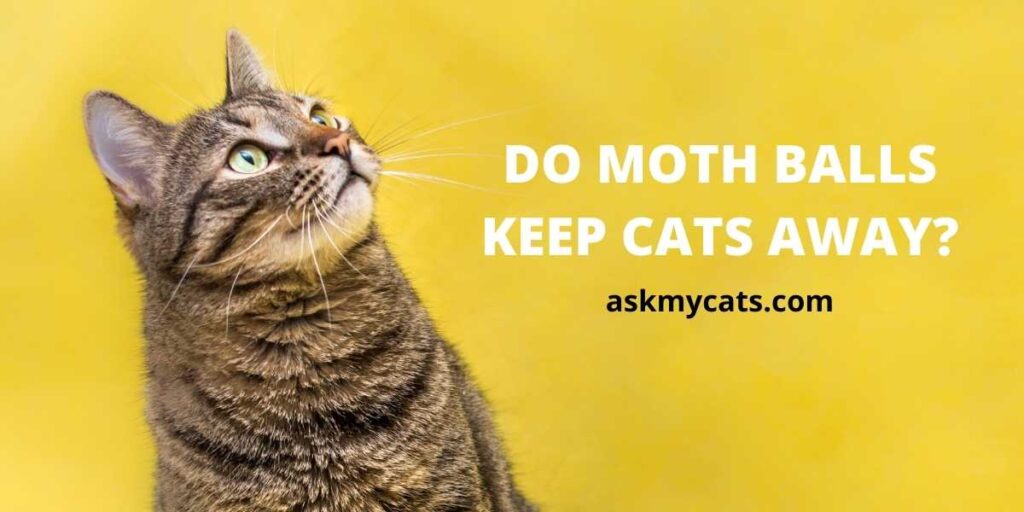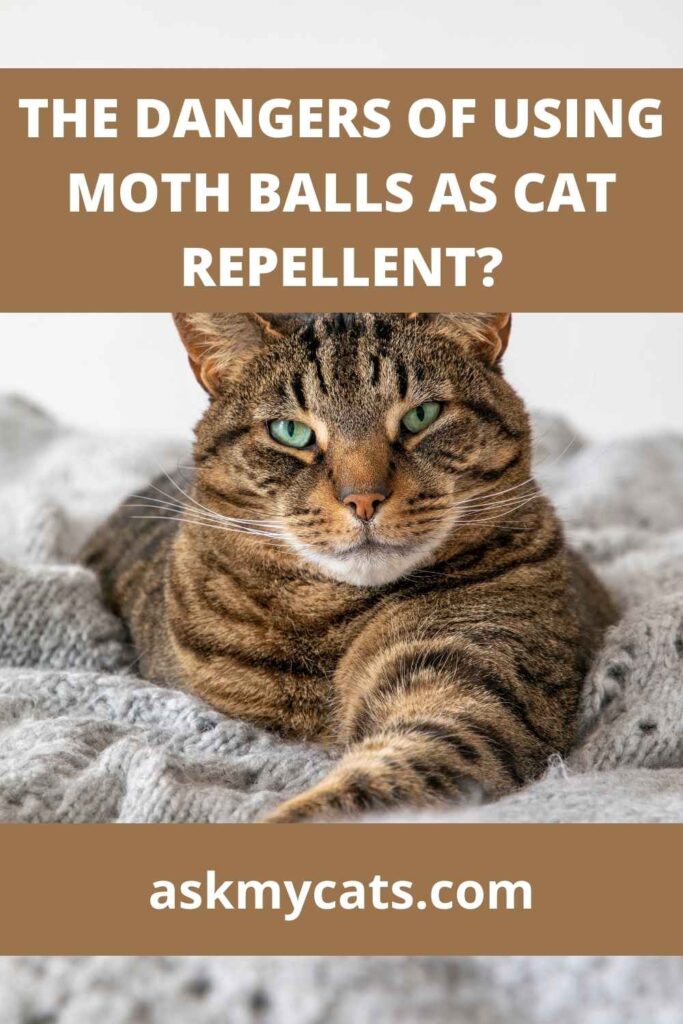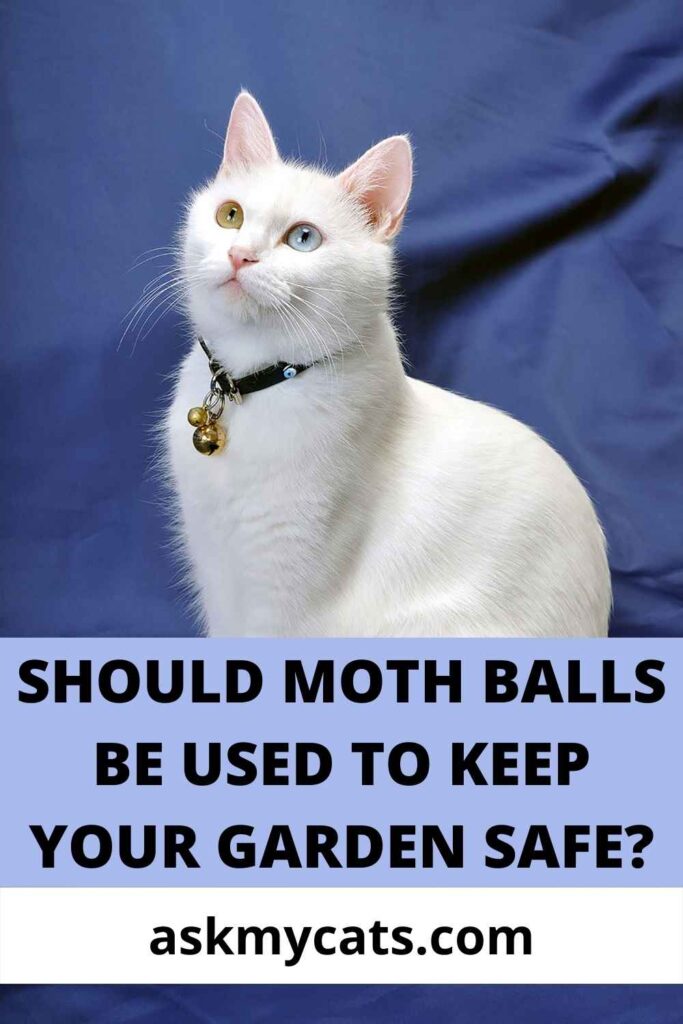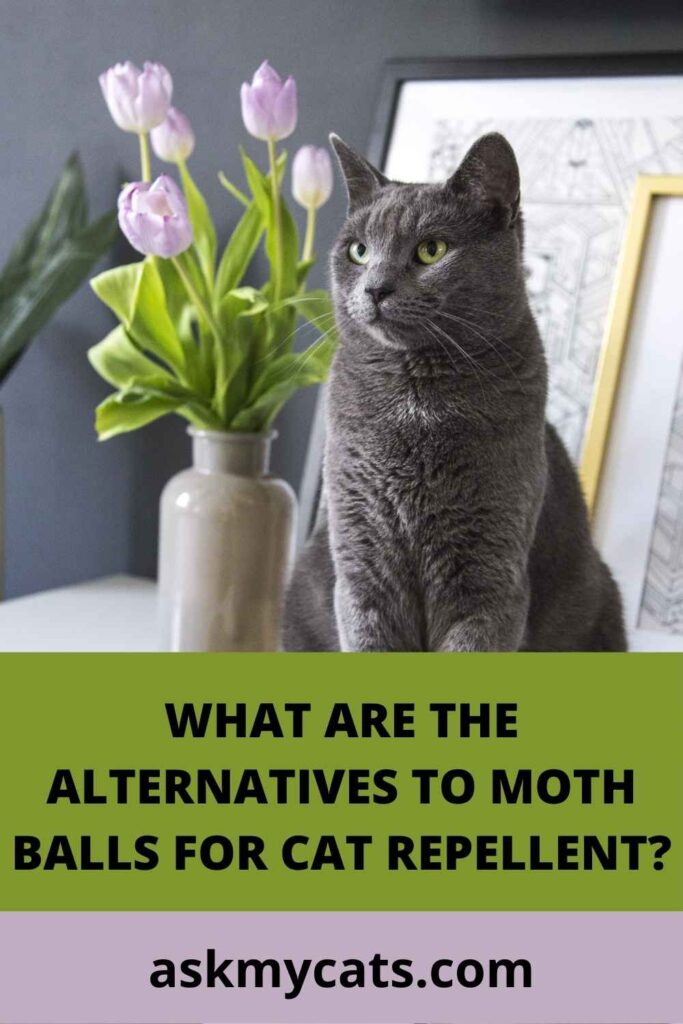It isn’t easy keeping neighboring cats away from your yard or garden always. Even if you use the best possible fence, stay on guard for the most part of the day, or keep the streets clean, one odd rebel feline may make its way into your area.
At times it may be tempting to use any available deterrent to repel the cats from your garden, but you must be mindful of what you use as a cat repellent.
Remember that the purpose of a cat repellent should be to only keep the cats away from your area, not to harm them in any way.
This is why whenever you look for an ingredient for a DIY cat repellent, make sure that the substance does not cause harm to the health of the cats.
Keeping this in mind we will navigate how mothballs may repel cats but these should still not be used as cat repellents due to their high toxicity and danger posed to the health of the cats.


Give Your Cat the Perfect Day
Get the Free Ebook!
Does The Smell Of Moth Balls Keep Cats Away?
In a word, yes. The smell of mothballs does keep cats away.
Mothballs are sublime in nature. This means that they go directly from the solid phase to vapors. These vapors of the mothballs are what kill the moths and their larvae in clothes and closets.
In a similar way, the mothball vapors also keep cats away, as they cannot tolerate the smell of these mothballs.
Check out more details about do cats like mothballs
The Dangers Of Using Moth Balls As Cat Repellent?

You should never use mothballs as a cat repellent because they are highly toxic and can harm the health of the cats in a serious manner.
1 – Mothballs are made of harmful ingredients
Most mothballs are made of either naphthalene or paradichlorobenzene.
These substances can cause great damage when ingested or inhaled, or sometimes even by mere contact.
While naphthalene can cause severe damage to the liver when ingested, paradichlorobenzene can lead to seizures in cats.
2 – Mothballs cause almost instant reactions
The harm caused due to mothballs is very quick, and it can cause severe problems allowing very less time to contact a vet and get help. This means that the intruding cat may actually even die before you can seek medical assistance.
3 – Mothballs can cause damage to multiple organs
Both naphthalene and paradichlorobenzene mothball affect not only the liver but also the kidney and blood cells of cats and even humans if ingested.
4 – Mothballs make for very cruel cat repellents as they cause many painful symptoms
If a cat ingests or inhales the vapors of a mothball, it may experience depression, lethargy, vomiting, diarrhea, loss of appetite, seizures, and intense pain in the stomach.
Can You Use Moth Balls In A Container With Holes In It?
Mothballs are excellent repellents – that cannot be denied. Owing to this, you may be tempted to wonder if it will be safer to use mothballs in a coffee can with holes in it.
The simple answer is no, you should not use mothballs even in a container with holes because the vapors of the mothballs do just as much damage as actually ingesting a mothball.
All the health problems and painful symptoms that have been mentioned above can be caused not only when a cat accidentally ingests a mothball, but also if a cat inhales too much of its vapors.
Also, check out Does Ammonia Keep Cats Away?
Should Moth Balls Be Used To Keep Your Garden Safe?

Mothballs are not at all intended to be used outdoors – not in the garden, nor near swimming pools. They are only meant for use in safer spaces like tightly closed closets.
If you use mothballs in your garden, not only will they pose danger to the intruding cats, but also to the very plants that you are trying to protect.
Mothballs seep into the soil over time and can get absorbed by your plants via their roots. This will cause the plants to slowly wither away due to the toxicity of the ingredients of the mothballs.
Moreover, if you have a garden where you grow food items such as tomatoes, chilies, or fruits, it is all the more pertinent that you do not use mothballs in your garden or anywhere near your plants.
The reason behind this is simple – the mothball will eventually seep into the soil, and thus will get absorbed by the plant via its root.
This further means that the fruits of your labor will actually have some content of the toxic ingredients of the mothballs, which can then harm your health.
Another major reason why mothballs should not be used outdoors or in your garden is because not only will it harm the health of the intruding cat, but it will also cause harm to other animals and birds, and even your own pet.
Also, check out Does Black Pepper Keep Cats Away?
What Are The Alternatives To Moth Balls For Cat Repellent?

There are many alternatives available for use as cat repellent that is much safer, cruelty-free, and effective.
Here are 5 such alternatives for you to consider while opting for a cat repellent for your garden or porch.
1 – Vinegar
Using a mixture of vinegar and water will have the dual benefits of cleaning your surfaces while keeping cats away.
Cats do not like the smell of vinegar and will thus avoid coming into the areas where you have sprayed your DIY vinegar cat repellent.
Check out more details: Does Vinegar Keep Cats Away?
2 – Lavender
Plant some lavender bushes in your garden. Not only will they keep cats away, but they will also enhance the beauty of your garden. What’s more – you will have a garden that is free of cats and smells really good!
3 – Coffee Grounds
Make a boundary with wet coffee grounds in the periphery of your garden. The smell of coffee will keep cats away, and the coffee grounds will eventually decompose and mix with the soil, thereby nourishing it.
More details: Do Coffee Grounds Keep Cats Away?
4 – Citrus Smells
You can opt for making a mix of the juice of lemon, orange, or any other citrus fruit with water – or you can simply put pieces or peels of the citrus fruits in the spots where you don’t want the intruding neighboring cats to come.
The strong, sour aroma will keep the cats away and leave your garden with a refreshing citrus smell.
5 – Automated or Motion-Sensor Sprinklers
Remember to set the intensity of the jet to a low enough value to just have a soft stream of water come out of it.
Whenever an intruding cat tries to enter your garden, the motion-activated sensors will activate the sprinklers and spray a soft stream of water on the cat. This will startle it and cause it to leave your garden.
Also, check out Does Bleach Keep Cats Away?
Frequently Asked Questions
Are mothballs toxic to gardens?
Yes, mothballs are very toxic to gardens. They seep into the soil and get absorbed by the plants which can then cause the plants to die.
What are some organic cat repellents to keep cats away?
If you want to make your own DIY cat repellent with organic ingredients that are safe for the cats and the plants, you can opt for citrus peels or coffee grounds. Not only will their scent repel cats, but they will also decompose and nourish the soil.
Final Words
Mothballs are harmful to the health of cats, as well as to birds and even humans. Moreover, mothballs seep into the soil and harm the plants of the garden.
So, using mothballs to safeguard your garden will actually be very counterproductive. These are highly toxic and should not be used outside.
Opt for the alternative ways of keeping cats away because your main aim should only be to keep the cats out of your area, you should not cause any harm to their health in any way.
Is it true or myth: Will Cayenne Pepper Keep Cats Away?
Must Read: 5 Natural & Safe DIY Home Remedies to Keep Cats Away
